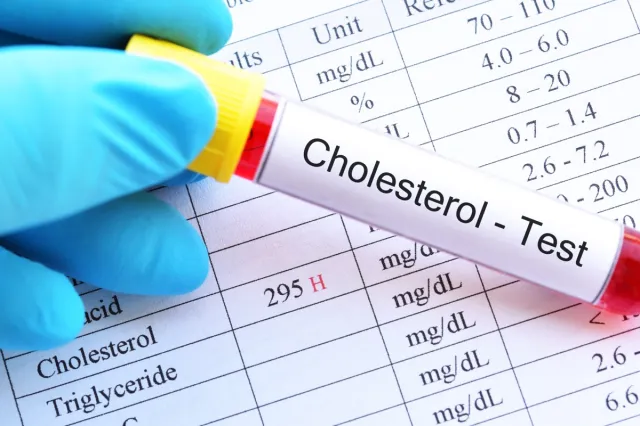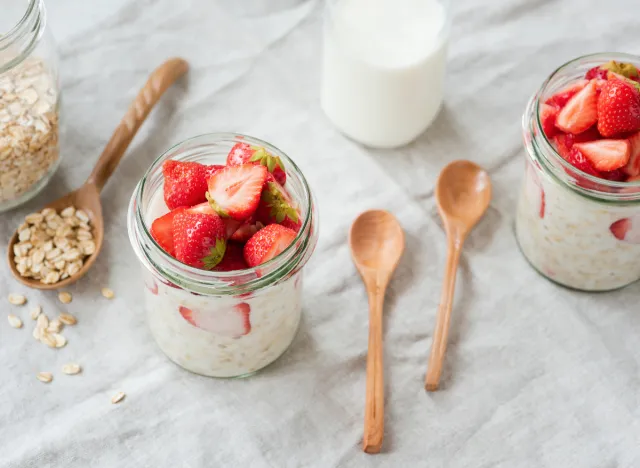8 Reasons Overnight Oats Should Be Your Breakfast Staple

Overnight oats have gained widespread popularity as a portable and nutritious breakfast option. According to a Prophecy Market Insights report, the market for store-bought, ready-made overnight oats in the U.S. reached $11.8 million in 2020, with projections to grow to $17.8 million by 2030. However, you don’t need to rely on store-bought options—you can easily make overnight oats at home, prepping them the night before to wake up to a ready-to-eat breakfast packed with fiber and essential nutrients.
From aiding weight management and boosting energy to improving digestion, overnight oats offer numerous health benefits. In this article, we’ll explore eight key benefits of eating overnight oats and how to easily incorporate them into your daily routine.
Read on to discover how this convenient, make-ahead meal can support your health goals and simplify your mornings. Then, be sure to check out 50+ Overnight Oat Recipes for Weight Loss.
They can support weight management.

Not only are overnight oats delicious, but they are also very filling. Because of this, several recent studies reveal the potential of oats to aid in weight management and appetite control. Oats are high in several nutrients such as protein, fiber, and healthy fats, promoting a feeling of fullness and reducing the likelihood of overeating.
RELATED: Can Eating Oatmeal Help You Lose Weight?
They can improve digestion.

Overnight oats are rich in a type of soluble fiber called beta-glucan, which can help promote healthy digestion. It does this by forming a gel-like substance in the gut, slowing down the movement of food through the digestive tract. In doing this, it helps regulate bowel movements, reduces constipation, and promotes overall gut health.
They may help you focus.

Oats may also help improve cognitive function and focus due to their high content of complex carbohydrates, which provide a steady flow of energy to the brain. This sustained energy supply can help support mental clarity and focus throughout the day.
Oats are also rich in other brain-boosting nutrients, such as B vitamins and magnesium, which may enhance cognitive performance. These benefits were seen in recent studies, where oats improved mental accuracy and the speed of completing mental tasks.
They can lower cholesterol levels.

Studies show that regularly eating oats can help lower cholesterol levels, thanks to their soluble fiber and other beneficial compounds. These compounds bind to cholesterol in the gut, aiding its removal from the body. As a result, this process can reduce the amount of cholesterol absorbed into the bloodstream, leading to lower LDL (“bad”) cholesterol levels.
They can lower blood pressure.

Overnight oats can also reduce blood pressure levels, especially in those who have high blood pressure. Fiber-rich foods like oatmeal can improve blood vessel function, supporting overall heart health and circulation. They also contain a specific group of antioxidants called avenanthramides that can increase nitric oxide production, helping to relax and dilate blood vessels to lower blood pressure.
A 2023 meta-analysis of 21 studies found oats were effective in lowering blood pressure levels compared to groups consuming more refined grains.
They can support immunity.

Oats can also boost immunity thanks to their rich content of beta-glucan, a type of soluble fiber that supports immune function. Beta-glucan helps activate specific immune cells called macrophages and neutrophils, enhancing the body’s ability to fight infections.
Oats also contain other key nutrients like zinc and selenium that play vital roles in maintaining a strong immune system. Incorporating oats into your diet regularly can provide essential support for your body’s natural defense mechanisms.
They can promote healthy blood sugar.

Oats are rich in slow-digesting carbohydrates and fiber, which is why one of the overnight oats benefits is that it eating them promotes a more stable and steady rise in blood sugar. Even in those with type 2 diabetes, multiple studies showed that eating oatmeal led to fewer blood sugar spikes and more steady glucose levels than other carb-containing meals. This is likely due to its fiber content that slows the digestion of carbohydrate present.
They can improve nutrition.

Overnight oats are rich in several essential nutrients many people don’t get enough, including fiber, magnesium, iron, and zinc. Since many people fall short of these nutrients, especially fiber and magnesium, oatmeal can be the perfect addition to fill these nutrient gaps.
And while overnight oats don’t include every essential nutrient on their own, they may up the intake of other essential nutrients, as popular toppings and protein add-ins are commonly added as nutritional boosters.
- Source: https://finance.yahoo.com/news/global-overnight-oats-market-quaker-160500448.html
- Source: https://www.ncbi.nlm.nih.gov/pmc/articles/PMC9930024/
- Source: https://www.frontiersin.org/journals/nutrition/articles/10.3389/fnut.2019.00171/full#:~:text=Oat%20%CE%B2%2Dglucan%20has%20been,regulators%20of%20host%20cholesterol%20homeostasis.
- Source: https://www.sciencedirect.com/science/article/abs/pii/S2405457722014218
- Source: https://www.ncbi.nlm.nih.gov/pmc/articles/PMC5885279/
- Source: https://pubmed.ncbi.nlm.nih.gov/16139284/#:~:text=In%20addition%2C%20avenanthramide%2D2c%20treatment,by%20nine%2Dfold%20in%20HAEC.
- Source: https://pubmed.ncbi.nlm.nih.gov/36435335/#:~:text=Conclusions%3A%20Oat%20consumption%20is%20effective,at%20matched%20total%20energy%20intake.
- Source: https://www.frontiersin.org/journals/nutrition/articles/10.3389/fnut.2023.1143682/full#:~:text=%CE%B2%2Dglucans%20emerged%20as%20an,monocytes%2C%20and%20natural%20killer%20cells.
- Source: https://www.ncbi.nlm.nih.gov/pmc/articles/PMC8063794/
- Source: https://www.ncbi.nlm.nih.gov/pmc/articles/PMC8229445/
- Source: https://www.ncbi.nlm.nih.gov/pmc/articles/PMC4690088/
- Source: https://www.ncbi.nlm.nih.gov/pmc/articles/PMC8625765/
- Source: https://www.ncbi.nlm.nih.gov/pmc/articles/PMC6124841/
- Source: https://ods.od.nih.gov/factsheets/Magnesium-HealthProfessional/#:~:text=An%20analysis%20of%20data%20from,to%20have%20low%20intakes%20%5B22%5D









